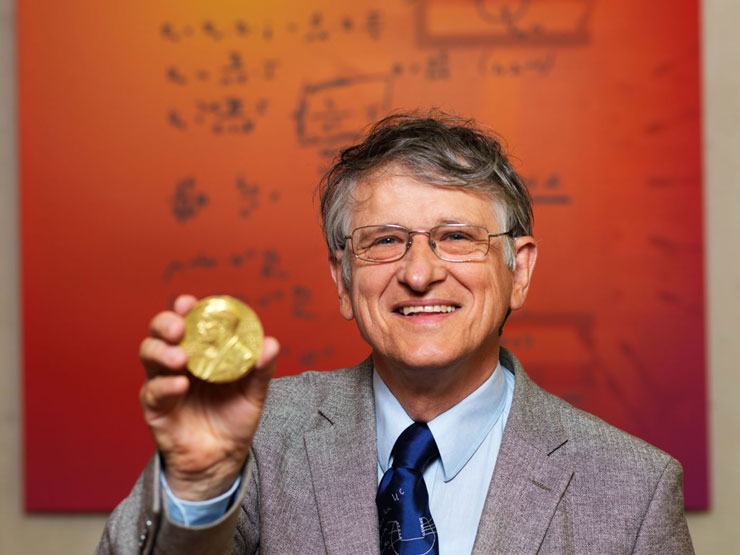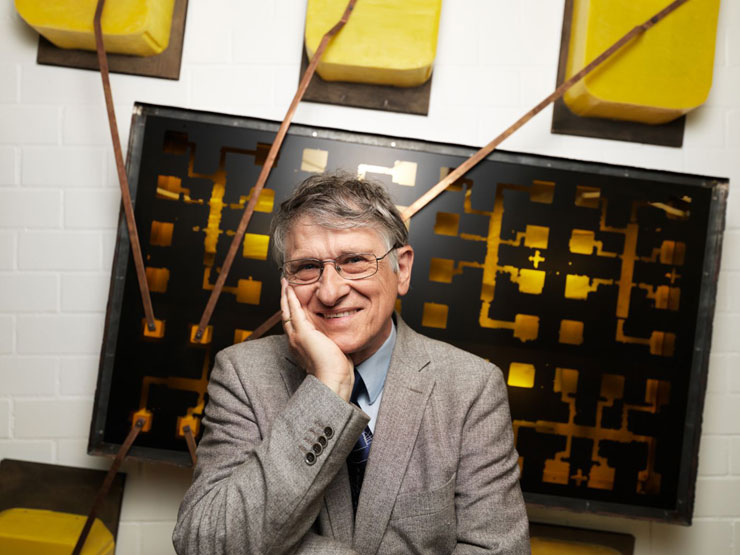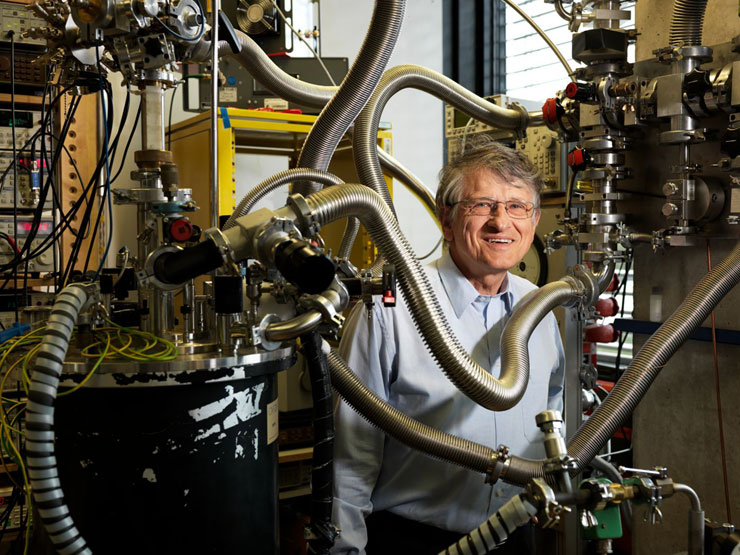Interview With Klaus von Klitzing, 1985 Nobel Prize Laureate In Physics
By Kourosh Ziabari
20 October, 2012
Countercurrents.org

Doing interviews with prominent scientists, especially the Nobel Prize laureates who eternalize their name in the history of science by achieving impressive and extraordinary breakthroughs is always a pleasure. It gives one the opportunity to enjoy the insight of these perceptive and intelligent scientists and opens new windows to one's understanding of the surrounding world.
Klaus von Klitzing was born on June 28, 1943 in Schroda, Reichsgau Posen , Germany , during the days of World War II. He received a diploma in physics from the Braunschweig University of Technology. This university is the oldest technical institute of higher education in Germany which was established in 1745 and currently has more than 14,000 students.
He continued his studies at the University of Wurzburg and completed his PhD there. He spent some time in Oxford 's Clarendon Laboratory to do advanced research work. His PhD thesis was titled "Galvanomagnetic Properties of Tellurium in Strong Magnetic Fields" which he finished working on in 1972. In 1980, he became a professor at the Technical University of Munich. Since 1985, Klaus von Klitzing has been the director of the Max Planck Institute for Solid State Research in Stuttgart .
In the years when the Nobel Prize in Physics was mostly awarded to two or three scientists each year, von Klitzing was the only one who received the 1985 Nobel Prize in Physics.
The Persian transcript of this interview was first published in Iran 's scientific publication "Daneshmand" magazine and its English version is appearing on CounterCurrents for the first time.
Kourosh Ziabari: What made you involved in physics? When did you realize that you might have a potentiality for studying physics and became interested in it? Have you ever been a science-loving child since your school days, or was it a gradual process that took many years to evolve?
Klaus von Klitzing: I was always interested in mathematics, already at the age of 8 years my teacher asked me to solve mathematical problems for older children. Therefore I had the idea to study mathematics at the university but I was disappointed by the mathematical education at the university, I wanted to apply my knowledge in mathematics. Therefore I switched to physics which uses mathematics as an important basis.
Kourosh Ziabari: Would you please explain about your invention of the Von Klitzing constant? It's said that it has been a remarkable contribution to physics, because it opens the door to allow a more precise measurement of the ohm. In what ways does this constant facilitate the measurement of electrical resistance?
Klaus von Klitzing: The discovery which led to the Nobel Prize was in the night of 4./5.2 1980 at 2 a.m. In my experiments on a silicon field effect transistor, an important microelectronic device, I saw an unexpected quantum phenomenon. I discovered, that in an experiment of the Hall effect in such devices the ratio of the measured voltage in these measurements to the electrical current (such a ratio has the dimension of a resistor) led always to a value 25812,807 Ohm. This resistance value was independent of the geometry and the fabrication method of the device. Today we know that the same phenomenon can be observed in many materials, the most recent one is graphene, a single sheet of carbon atoms. Important is, that the electrons flow in a very thin layer, a two-dimensional motion. My experiments were repeated by many laboratories all over the world and the value of the measured resistance were everywhere the same. The accuracy of the measurements was limited by the accuracy of a reference resistor. It became clear, that my discovery, the quantized Hall resistance, offers a more stable and more reproducible resistor than any wire resistors which are sensitive to temperature and instabilities of the metal. Therefore in 1990 an international agreement led to the introduction of the conventional von Klitzing constant with a fixed value of RK-90 = 25812,807 Ohm. Everywhere in the world all calibrations of electrical resistances are based on this definition so that my discovery led to a new worldwide standard
Kourosh Ziabari: Would you please tell us about your graduate paper on the "Lifetime
Measurements on InSb?" What's the significance of figuring out the electrical properties of indium antimonide? What are the applications of indium and antimony?
Klaus von Klitzing: At the time of my university studies (around 1965) two new modern topics were in the focus, laser and semiconductors. I selected a diploma thesis connected to optics in semiconductors. One of the most interesting new semiconductors was indium antimonide which is contrary to silicon an interesting material for optics, especiall in the infrared region. I remember that I could detect the radiation emitted by my hand since the temperature of a human is normally higher than the environment. I analyzed the change of the electrical resistance of indium antimonide if some radiation is absorbed and how fast such process is.

Kourosh Ziabari: Studying semi-conductors has always been a source of fascination and interest for you. In your researches, you were enthralled by the effects of strong magnetic fields on semi-conductors. Why were you so interested in semi-conductors? As to what I've noted, you have dedicated a great deal of your research to semi-conductors. Would you please tell us more about that?
Klaus von Klitzing: Semiconductors are the most important material in modern electronics and our daily life is dominated by semiconductors if we use computer, solid state laser and LEDs or wireless communication. Photovoltaic is another important application of semiconductors which hopefully will solve energy problems. In order to optimize semiconductor properties one has to understand the microscopic electronic properties and in my research I used very often low temperatures (in order to avoid disturbances from the thermal energy) and high magnetic fields which influences the motion of electrons in semiconductors so that one get more detailed information about microscopic properties.
Kourosh Ziabari: You left Germany and went to Oxford in 1975 to enjoy the advanced facilities and powerful superconducting magnets which were available there. Please tell us about your interaction with Oxford . What's your assessment of the academic environment of Oxford and the impression it gave you?
Klaus von Klitzing: All scientists should try to work at other laboratories in order to broaden the knowledge. I met at a conference in 1972 a professor from Oxford who was famous for his research on semiconductors. I applied for a grant and went with my family to Oxford , a fantastic place. In the following years I went also to France and the US and at all places I learned new techniques and made long-lasting friendships.
Kourosh Ziabari: Today, the greater part of your research is focused on the properties of low-dimensional electronic systems, typically in low temperatures and in high magnetic fields. Would you please explain more about what you study and research on these days?
Klaus von Klitzing: During my Ph.D work I discovered by accident, that the electrical resistance of a semiconductor may change drastically by changing the preparation of the surface of the material. This was the starting point of my research on so called two-dimensional electronic systems. Today I focus on very small materials where the extension of the device influences the electronic and optical properties. These are important phenomena where quantum mechanics dominate the properties if we miniaturize devices. The field is called nanoelectronics and quantum dots are for example one interesting research field where single electrons dominate the electronic behaviour.
Kourosh Ziabari: What's the main difference between your discovery of quantum Hall effect and what Edwin Hall discovered in 1879 entitled the Hall Effect? In what ways is your discovery different from the fractional quantum Hall Effect? Is there any significant discrepancy?
Klaus von Klitzing: The influence of a magnetic field on moving electrons was already described by Edwin Hall more than 130 years ago. The force on electrons perpendicular to the direction of the magnetic field and the velocity of the electrons is the basis of the Hall Effect. Edwin Hall investigated a gold film where, like in any metal, very many electrons contribute to the electrical current and the free motion of the electrons is relatively short. In contrary, the free motion in semiconductors can be so long, that the electrons move on close circles in a perpendicular magnetic field, similar to the motion of electrons around the nucleus in an atom. The Bohr atomic model says that very special energies are allowed for electrons moving on a closed orbit and the same is valid for the electron motion in strong magnetic fields. Each electron orbit occupies a certain area and if the number of electrons in a two-dimensional plane and the strength of the magnetic field (which influences the diameter of the so-called cyclotron orbit) is adjusted in such a way that all the electrons are closely packed in the two-dimensional plane, one observes the quantum Hall effect. The measurable Hall voltage perpendicular to the electric current divided by the current is under this condition exclusively determined by the von Klitzing constant h/e2 (h=Planck constant, e=elementary charge).
In this picture the interaction between the electrons is ignored. The fractional quantum Hall Effect (Nobel Prize 1998) can only be explained if one includes electron-electron interactions which lead to new quantum phenomena in addition to the integer quantum Hall effect.

Kourosh Ziabari: In your researches, you realized that as the magnetic field grew stronger, the Hall resistance grew stronger for a while and then evened out. If I'm not mistaken, this leveling off and stagnation was not observed by Hall and you were the first one who discovered why this oscillation happened. Would you please explain more about this?
Klaus von Klitzing: As discussed in the last question, the cyclotron orbit of the electron motion in a magnetic field becomes smaller and smaller if the magnetic field increases and the fundamental quantized Hall resistance is observed if the magnetic field and the two-dimensional electron concentration is adjusted in such a way, that a densely packed electron layer exists. We call this situation as filling factor one. If the magnetic field is reduced by a factor two, each electron orbit occupies twice as much in area as at the higher magnetic field so that only half of the electrons fit in the so-called lowest Landau level. The other half of electrons will fully occupy the next higher Landau level and such filling factor two fulfills again the condition of the quantum Hall effect. This simple picture does not explain the fact, that the quantized Hall resistance is not observed only at a very special magnetic field but within a certain magnetic field range- the Hall voltage does not increase monotonically if the magnetic field is increased but levels off. This stabilization of the Hall resistance can be explained if one includes disorder. All materials are not ideal and the quantum Hall effect is one of the few examples in nature were dirt helps to stabilize a phenomenon.
Kourosh Ziabari: You spent the majority of your academic career in Germany and didn't travel to the U.S. or UK for continuing research and teaching, as many prominent scientists, especially the Nobel Prize laureates do. You are still the director of Max Planck Institute for Solid State Research in Stuttgart . Why did you opt for staying in Germany and continuing your scientific activities there?
Klaus von Klitzing: I had research stays in many countries, I am member in nearly all academy of sciences ( China , Russia , USA , England etc.), have honorary doctoral degrees in 12 countries so that I have an excellent overview about research activities all over the world. I came to the conclusion that the Max Planck Society is worldwide the best place for basic research. Fortunately, basic research in Germany is accepted as a part of our culture. The success of the research at the Max Planck Society is based on the fact, that the research activities are exclusively determined by the directors of the institutes which are selected exclusively on the basis of their scientific merit. I am absolutely free in determining the topic of my research. However I have to demonstrate that I am world leading in my research field.
Kourosh Ziabari: What's your assessment of the state of sciences in Germany ? I know that several German scientists have won prestigious awards such as the Nobel Prize in different sciences and of course Germany is considered to be one of the most prominent countries in the world in terms of the infrastructure of scientific and academic studies. However, I want to know if you have found any significant differences between Germany and its scientific rivals such as France , UK , the U.S. and Australia .
Klaus von Klitzing: Germany has few natural resources and it is generally accepted that science and technology drives our economy. Therefore investments in research and education play an important role and even during the last financial crisis the support was not interrupted. As mentioned before, the Max Planck Society has a unique position not only in Germany but in the whole world. Even if the financial support comes from the central and local governments, the freedom of the directors of the Max Planck Institutes in selecting the most successful research topics remains guaranteed. This explains the success of the Max Planck Society (called Kaiser Wilhelm Gesellschaft before World War II) which celebrates this year the 100th anniversary. In total 32 Nobel Prize Winner are associated with the Max Planck/Kaiser Wilhelm Gesellschaft and I am convinced that also in the future, most of the scientific Nobel Prize Winner in Germany will belong to the Max Planck Society. Many other countries try to establish successful basic research and countries like China , Korea or India want to open Max Planck Institutes and to support basic research. On the other hand many countries expect a pay-off from basic research within a relatively short time which is not realistic.
Kourosh Ziabari: How has winning the Nobel Prize changed your life? Have you felt a conceivable impact on your life after winning the Nobel Prize?
Klaus von Klitzing: I try to continue my life in the same way as before the Nobel Prize but the main problem is that the outside world expects that Nobel Prize winner know everything and are responsible to solve the big problems in the world. Indeed, Nobel Prize Winner have a more global view and worry about global problems like climate change or the dissemination of nuclear weapons. Many humans in our world know that changes are necessary but believe that they are powerless. On the other hand they expect that Nobel Prize Winner are authorities which have the responsibility to be active out side their own field of specialty. This is an additional burden for Nobel Prize Winner and changes their life automatically.
Kourosh Ziabari: What's your recommendation for the young students who want to become great scientists and tread the path which noble people like you have traversed? What steps should the young scientists take in order to excel in their field of study and become prestigious authorities?
Klaus von Klitzing: First of all the student needs an excellent basis in mathematics and theoretical physics. He should be an expert in a certain traditional field but should try to apply his knowledge in a new field at the boundary between different disciplines. He should always question the opinion of so-called experts and I always recommend a stay in a foreign country and a change in the research place after about 5 years.
Kourosh Ziabari is an Iranian journalist
Comments are moderated


